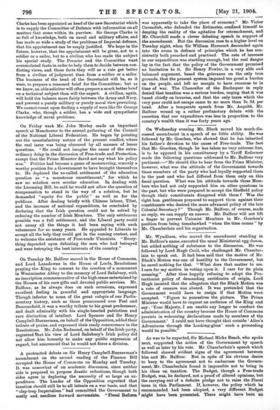A protracted debate on Sir Henry Campbell-Bannerman's amendment on the
second reading of the Finance Bill occupied the House of Commons on Monday and Tuesday. It was somewhat of an academic discussion, since neither side is prepared to propose drastic reductions, though both sides agree in deploring the necessity of so large an ex- penditure. The Leader of the Opposition regretted that taxation should still be to all intents on a war basis, and that "clap-trap Imperialism" had committed the Government to costly and needless forward movemints. "Fiscal Reform
was apparently to take the place of economy." Mr. Victor Cavendish, who defended the Estimates, confined himself to denying the reality of the agitation for retrenchment, and Mr. Churchill made a clever debating speech in support of the amendment. But the discussion rose to a higher level on Tuesday night, when Sir William Harcourt descended again into the arena in defence of principles which he has con- sistently both preached and practised. The rate of increase in our expenditure was startling enough, but the real danger lay in the fact that the policy of the Government promised no limitation to it. Sir Henry Fowler, in a very able and balanced argument, based the grievance on the only true grounds, that the present system imposed too great a burden on the people, and left no margin to have recourse to in time of war. The Chancellor of the Exchequer in reply denied that taxation was a serious burden, urging that it was based chiefly on luxuries, and that the only taxes which the very poor could not escape came to no more than 7s. 3d. per head. After a temperate speech from Mr. Asquith, Mr. Balfour wound up a rather perfunctory debate with the assertion that our expenditure was less in proportion to the country's wealth than it was forty years ago.


































 Previous page
Previous page